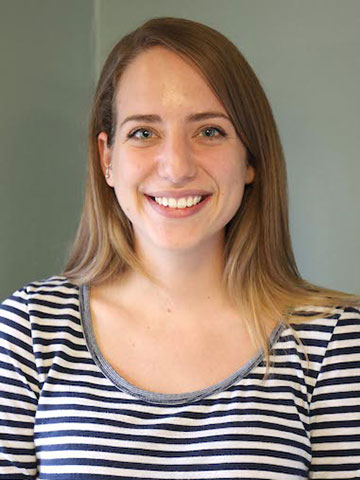Food Matters: Connecting families in need with community resources
07/05/2017
This year, Kathryn Krupsky, a Master of Public Health student and graduate research assistant at the College had a behind-the-scenes look at what it means to be a part of an interdisciplinary, community-based research team through the Food Matters STL project, an initiative focused on improving the connections between families, pediatricians and community help.

“It’s not like one parent failed to do their duty,” says Krupsky. “This is a systemic issue and we want to do what we can to help from a public health, social work and a clinical perspective.”
The idea builds on research, led by Ellen Barnidge, associate professor of behavioral science and health education, and colleagues at Danis Pediatric Center in St. Louis, that revealed a startling discrepancy.
When pediatricians ask about their food situation, only two to three percent of caregivers voiced concerns; the study revealed that in reality more than half were experiencing “food insecurity” or unreliable access to a sufficient quantity of affordable, nutritious food.
“When you read about a social determinants of health issue, such as food insecurity, you get really caught up in the data and the literature. But when you actually put a person behind it and you have real words associated with it…‘We’re all parents, we want what’s best for our kids, but we have bills to pay”...it makes a difference,” Krupsky says.
The caregivers may also be hesitant to disclose their situation in case social services would be alerted, while others might not understand why they would tell a doctor about their budget issues, Barnidge adds.
Thanks to pilot funding through the Dean’s office, the Food Matters project is working to connect the dots though a “clinic to community” model, by working with pediatricians on training, social workers on making connections and Operation Food Search, a community-based partner, on food assistance.
Krupsky has had a boots-on-the-ground research experience of a lifetime: she helped develop training modules for the pediatrics department, created surveys for data collection, practiced skills in qualitative coding and analysis, co-facilitated partnership meetings, and managed essential project development tasks, such as submitted protocols to the Institutional Review Board.
“I was entrusted with important tasks, such as setting agendas for meetings, presenting our work at conferences and participating as an author in published manuscripts we’ve written as a team,” says Krupsky.
“This project has greatly influenced my educational experience. Not only have I played a role in important public health research, I’ve taken part in the development of a collaborative public health intervention that we designed and implemented in a thoughtful and inclusive way.”
Kat Krupsky
Studies have shown that children who live in food insecure households have more cognitive, emotional and physical health changes throughout their life -- including greater risks of multiple chronic diseases and obesity, says Barnidge. If successful, these interventions could have a lifelong, positive impact on the children’s health and well-being.
###
This article first appeared in the Spring 2017 issue of SoJust magazine, the College for Public Health and Social Justice's alumni magazine.
About the College for Public Health and Social Justice
The Saint Louis University College for Public Health and Social Justice is the only academic unit of its kind, studying social, environmental and physical influences that together determine the health and well-being of people and communities.
It also is the only accredited school or college of public health among nearly 250 Catholic institutions of higher education in the United States. Guided by a mission of social justice and focus on finding innovative and collaborative solutions for complex health problems, the College offers nationally recognized programs in public health, social work, health administration, applied behavior analysis, and criminology and criminal justice.